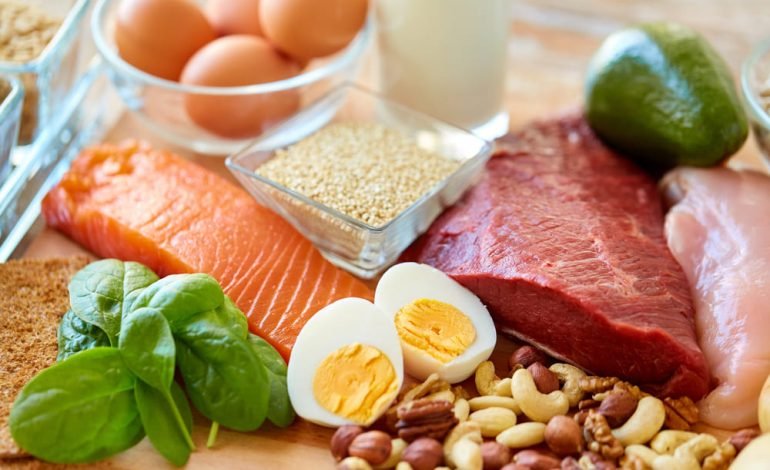How much protein do we really need?

It is a question that is always asked of any medical or wellness professional: How much protein do we really need?
Awareness around the importance of protein has greatly increased for the better over the past decade. Along with this comes a whole industry of protein powders, bars and supposedly high protein products lining every supermarket shelf.
Experts in the fields of science and sport all agree that protein is an essential nutrient. However they do not all agree on the amount.
The Dietary Guidelines for Americans 2015–2020 recommend that:
- Females aged 19 or older need 46 grams (g) of protein daily
- Males aged 19 or older need 56 g of protein daily
- The World Health Organization (WHO) recommend 0.83 g of protein per kilogram of weight each day
That works out to around 0.36 g per pound of body weight
That means:
- Someone weighing 150 pounds (lbs) needs 54 g per day
- Someone weighing 200 lbs needs 72 g per day
It’s worth noting that these are just guidelines, though. For example, people who train will need to consume more.
As we age our ability to breakdown and absorb protein decreases, our need to maintain muscle strength and function increases, thus the requirements are greater.
For most people, however, these levels will be adequate to stave off deficiency, which doesn’t mean achieve optimisation.
What many scientists now suggest
These government guidelines are currently significantly lower than the amounts suggested by a large majority of the scientific community.
According to Andrew Huberman, professor of neurobiology and optimology at Harvard, a good starting point for protein consumption is about 1 gram per pound of body weight or 2.2 grams per kilogram.
This intake is especially relevant for people engaged in regular resistance training or those who are trying to increase muscle mass.
It’s also important to ensure the quality of the protein and to distribute the right intake throughout the day for optimal muscle protein synthesis.
Additionally, muscle tissue synthesis is greater early in the day due to certain gene expressions, which suggests that incorporating quality proteins and amino acids early in the day may contribute more to muscle growth than equivalent protein intake later.
This is due to the expression of the BMAL gene, making it beneficial to ingest protein before 10am if muscle growth is the main trining goal.
What women may need – and how it changes with age
According to Dr Stacey Sims, exercise physiologist, women aged 20–35 should target a daily protein intake of 1.6–2.2g/kg (0.7g–1g/lb), while older women, especially those experiencing perimenopause or menopause, may require slightly more.
In 2023 a study cause the International society of sports nutrition to change it stance on nutritional concerns of the female athlete, suggesting that daily intake should range from 1.4–2.2g/kg (0.6g–1g/lb), with an emphasis on distributing protein evenly across meals every 3–4 hours.
This approach will help in maintaining lean body mass and will aid in managing body composition and weight loss.
Interestingly, studies also highlight an increased requirement during the latter two weeks of the menstrual cycle (luteal phase).
Ageing and muscle resistance
Dr Sims explains, as women enter perimenopause and menopause, their protein requirements may rise to about 2–2.3g per kg of body weight (~1–1.2g per lb).
Ageing brings about a greater resistance to the muscle-building effects of protein and exercise, necessitating higher protein consumption in both men and women.
Research reveals that older women experience a diminished response in muscle protein synthesis (MPS) after meals.
Some studies suggest a decrease of up to 40% in MPS compared to younger counterparts, even when both groups take in the same amount of essential amino acids (EAAs), building blocks of protein.
This reduced response is also evident following strength training sessions.
Protein’s wider health role
Sufficient protein intake is crucial for numerous aspects of health beyond just maintaining muscle.
It plays a vital role in supporting:
- Bone health
- Brain function
- Conduction of nerve signals
Insufficient amounts can result in problems such as cognitive decline, osteopenia, and sarcopenia (the loss of muscle mass and strength) as we age.
Whole foods first – but supplementation has its place
While it’s best to obtain protein primarily from whole food sources, supplements can be beneficial for those who find it challenging to meet their needs through diet alone.
Not everyone needs protein supplementation, however it can be a handy option for meeting daily protein goals when dealing with busy lives or for those who opt not to consume animal products.
So how much do we really need?
Taking the most recent research into consideration, aim for approximately 1.4–2.2g of protein per kg of body weight per day.
Equally space this thought out the day.
Be especially mindful as you head toward middle age or if you are regularly training or play sports.
If you require further help seek out a qualified nutritionist.
For more health and lifestyle features, visit EyeOnLondon. We’d love to hear your thoughts in the comments – how do you approach your own nutrition, and has it changed over time?
[Image Credit: Syda Productions/Shutterstock]
Follow us on:
Subscribe to our YouTube channel for the latest videos and updates!
We value your thoughts! Share your feedback and help us make EyeOnLondon even better!









